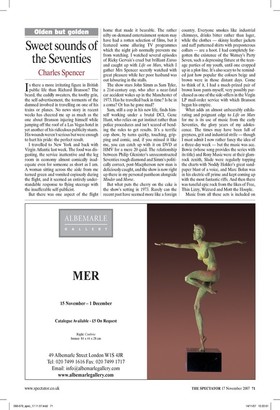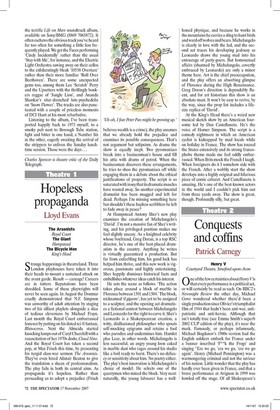Sweet sounds of the Seventies
Charles Spencer Is there a more irritating figure in British public life than Richard Branson? The beard, the cuddly sweaters, the toothy grin, the self-advertisement, the torments of the damned involved in travelling on one of his trains or planes. No news story in recent weeks has cheered me up as much as the one about Branson injuring himself while jumping off the roof of a Las Vegas hotel in yet another of his ridiculous publicity stunts. His wounds weren't serious but were enough to hurt his pride: the perfect result.
I travelled to New York and back with Virgin Atlantic last week. The food was disgusting, the service inattentive and the leg room in economy almost comically inadequate even for someone as short as I am. A woman sitting across the aisle from me turned green and vomited copiously during the flight, and it seemed an entirely understandable response to flying steerage with the insufferable self-publicist.
But there was one aspect of the flight home that made it bearable. The rather nifty on-demand entertainment system may have had a rotten selection of films, but it featured some alluring TV programmes which the night job normally prevents me from watching. I watched several episodes of Ricky Gervais's cruel but brilliant Extras and caught up with Life on Mars, which I gather Mrs Spencer secretly watched with great pleasure while her poor husband was out labouring in the stalls.
The show stars John Simm as Sam Tyler, a 21st-century cop, who after a near-fatal car accident wakes up in the Manchester of 1973. Has he travelled back in time? Is he in a coma? Or has he gone mad?
Sam, still a cop in his new life, finds himself working under a brutal DCI, Gene Hunt, who relies on gut instinct rather than police procedures and isn't scared of bending the rules to get results. It's a terrific cop show, by turns quirky, touching, gripping and comic, and, if you missed it like me, you can catch up with it on DVD at HMV for a mere 20 quid. The relationship between Philip Glenister's unreconstructed Seventies rough diamond and Simm's politically correct, post-Macpherson new man is deliciously caught, and the show is now right up there in my personal pantheon alongside Minder and Morse.
But what puts the cherry on the cake is the show's setting in 1973. Rarely can the recent past have seemed more like a foreign country. Everyone smokes like industrial chimneys, drinks bitter rather than lager, while the clothes — skinny leather jackets and naff patterned shirts with preposterous collars — are a hoot. I had completely forgotten the existence of the Watney's Party Seven, such a depressing fixture at the teenage parties of my youth, until one cropped up in a plot-line. It's also scary to be reminded just how popular the colours beige and brown were in those distant days. Come to think of it, I had a much-prized pair of brown loon pants myself, very possibly purchased as one of the side-offers in the Virgin LP mail-order service with which Branson began his empire.
What adds an almost unbearably exhilarating and poignant edge to Life on Mars for me is its use of music from the early Seventies, the glory years of my adolescence. The times may have been full of greyness, grit and industrial strife — though I must admit I now rather fancy the idea of a three-day week — but the music was ace. Bowie (whose song provides the series with its title) and Roxy Music were at their glamrock zenith, Slade were regularly topping the charts with Noddy Holder's great sandpaper blast of a voice, and Marc Bolan was in his electric-elf prime and kept coming up with the most fantastic riffs. And then there was tuneful epic rock from the likes of Free, Thin Lizzy, Wizzard and Mott the Hoople.
Music from all these acts is included on the terrific Life on Mars soundtrack album, available on Sony/BMG (8869 7065872). It often eschews the obvious track you've heard far too often for something a little less frequently played. We get the Faces performing 'Cindy Incidentally' rather than the usual 'Stay with Me', for instance, and the Electric Light Orchestra sawing away on their cellos to the exhilaratingly bleak '10538 Overture' rather than their more familiar 'Roll Over Beethoven'. There are some unexpected gems too, among them Lee 'Scratch' Perry and the Upsetters with the thrillingly bonkers reggae of 'Jungle Lion', and Ananda Shankar's sitar-drenched late-psychedelia on 'Snow Flower'. The tracks are also punctuated with a couple of priceless moments of DCI Hunt at his most rebarbative.
Listening to the album, I've been transported happily back to 1973 myself, to a smoky pub next to Borough Tube station, light and bitter in one hand, a Number Six in the other, eagerly awaiting the arrival of the strippers to enliven the Sunday lunchtime session. Those were the days ...
Charles Spencer is theatre critic of the Daily Telegraph.





































































 Previous page
Previous page